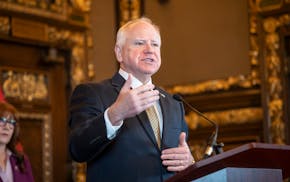A Bloomington ride-service company that initially sought to design a mobile pantry for dispensing food and beverages during trips made a drastic pivot when COVID hit: getting frontline nurses, and their elderly patients, safely to hospitals.
In spring 2020, the group of technologists behind Edwards RideCare felt compelled to help nurses working on the frontlines go to and from hospitals safely. They raised thousands of dollars for gas and readied their vehicles, but had one problem: Protecting themselves and their important passengers from the virus while in transit.
Within months, the founders developed a virus barrier using specialized material to separate the air between the front and back seats. And by summer 2020, they were giving free rides to nurses and beginning a business that would affect more than just health care workers.
"The nurses, after about a month or two, they started pleading [with] us to start driving seniors to their appointments," President and co-founder Darrell Lynds said. "The nurses saw what was happening in the intensive care units, and they saw what was happening in the hospitals with seniors, and it was heart wrenching."
With COVID-19 still lingering and influenza being a year-round virus that spikes in the fall and winter months, the company's leaders decided it was best to make their filtration systems available "pandemic or no pandemic," Lynds said.
Since 2021, the company's drivers have provided more than 3,000 rides across the Twin Cities to not only seniors, but people with limited abilities, the immunocompromised and those who simply desire an infection-free ride.
A clean room on wheels
The company's original 2019 plan was to find a solution for underpaid, independent contract drivers, specifically those working for Uber and Lyft. That included the mobile pantry system that would give drivers a chance to supplement their unsteady income.
That business launched in March 2020, at the onset of the pandemic when nearly all ride-sharing companies halted business to avoid passengers, and drivers, from contracting or spreading COVID-19.
So the team pivoted to focus on creating a way to protect drivers and passengers from the virus, said co-founder and Chief Executive Kevin Spanbauer.
The founders landed on a clean room on wheels. A generic plexiglass sneeze guard wouldn't suffice.
The virus barrier is computer manufactured to fit the dimensions of each vehicle. To circulate and filter air flowing from the front of the vehicle to the back, they engineered a high-efficiency particulate air filter, or HEPA filter, and coined it the ESPS for Edwards Safe Passage System.
A proprietary sanitation system based on Centers for Disease Control and Prevention standards also cleans the passenger area between rides.
As COVID cases eased, it became clear to the founders that seniors would need a permanent virus-free mode of transportation. To improve the rider experience for seniors, they added a specially designed handle bar to use when entering and exiting the vehicle.
Many of the seniors they serve no longer own vehicles and have been dependent on unreliable providers that lacked training in transporting an elderly person with medical or mobility issues. Many nurses shared stories having to drive senior patients home because the ride-service provider never showed, Spanbauer and Lynds said.
"We have not seen anybody else in [transportation] trying to change how things are done," Spanbauer said. "It's been the status quo, the same level of service, the same problems for decades. We're coming at it and saying, 'Wait a minute, this is broken.' Somebody has to fix this and make their lives better so these seniors can continue to have their independence."
For about a year, 91-year-old Norma Leary has used Edwards RideCare for her trips from the Village Shores senior living campus in Richfield to her doctor's appointments, the grocery store and the pharmacy.
"It's very helpful," Leary said, "because I don't have a car anymore, and I don't have any relatives close by I can count on."
Leary's son, who lives in another state, was seeking a safe, secure and reliable mode of transportation for his mother. Once he found the Twin Cities-based provider, he prepaid her rides for a full year.
Driver en route
Using their extensive background in software, the founders designed an online scheduling and communication system that allows passengers, family members and caregivers to input pick-up and drop-off information and also select the driver. Through the system, clinics can alert drivers when their passenger will be ready for pickup. People can also schedule rides by calling a direct number.
Pricing for scheduled ride service through Edwards RideCare starts at $27 per ride. Service is available Monday through Saturday.
Spanbauer and Lynds plan to expand into other cities in Minnesota, such as Rochester or Duluth. They are also eyeing larger markets like Chicago and states where there's a bigger population of seniors. Relationships with clinics and senior living operators will fuel that expansion, they said.
The executive team at Edwards RideCare has a goal of employing 80 full-time drivers in the Twin Cities within the next two to three years. As the business grows, they anticipate drivers to operate in shifts. The company installs its barrier system into the vehicle of its independent drivers but declined to disclose how many are currently under contract.
When hiring drivers, the leaders of Edwards RideCare have learned they need to go beyond traditional background inspections, including checking criminal history and drug testing. They conduct interviews — not part of Uber or Lyft's strategy — to gauge personality traits that fit with providing a service to seniors, Spanbauer said. Those skills tend to appear in drivers that have worked as nurse aides, in the senior care industry, as personal care assistants or as social workers, he said.
Mike Lynds, Darrell's son and co-founder of the business, is an aircraft mechanic who helped design the air-filter system. He's also been Leary's selected driver the past several months.
In addition to driving her around, he often carries her groceries into her residence. She appreciates his commitment, in more ways than one.
"He's been really nice," Leary said. "And he's always on time."

Delta hiked fares for solo travelers, until Twin Cities travel experts caught the change

In first speech back, UnitedHealth's new CEO pledges to review hot-button issues

A child had measles at Mall of America, concerning state health officials who don't know source

Ramstad: Gov. Walz, things are not getting done in Minnesota




